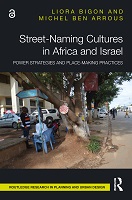Street-Naming Cultures in Africa and Israel
Proposal review
Power Strategies and Place-Making Practices
Abstract
"This book is focused on the street-naming politics, policies and practices that have been shaping and reshaping the semantic, textual and visual environments of urban Africa and Israel. Its chapters expand on prominent issues, such as the importance of extra-formal processes, naming reception and unofficial toponymies, naming decolonisation, place attachment, place-making and the materiality of street signage. By this, the book directly contributes to the mainstreaming of Africa’s toponymic cultures in recent critical place-names studies. Unconventionally and experimentally, comparative glimpses are made throughout between toponymic experiences of African and Israeli cities, exploring pioneering issues in the overwhelmingly Eurocentric research tradition. The latter tends to be concentrated on Europe and North America, to focus on nationalistic ideologies and regime change and to over-rely on top-down ‘mere’ mapping and street indexing. This volume is also unique in incorporating a rich and stimulating variety of visual evidence from a wide range of African and Israeli cities. The materiality of street signage signifies the profound and powerful connections between structured politics, current mundane practices, historical traditions and subaltern cultures.
Street-Naming Cultures in Africa and Israel is an important contribution to urban studies, toponymic research and African studies for scholars and students. "
Keywords
Africam Arrous, Ben, Bigon, Cultures, Israel, Liora, Making, Michel, Naming, Place, Power, Practices, Strategies, StreetDOI
10.4324/9781003173762ISBN
9781032003474, 9781032003511, 9781003173762Publisher
Taylor & FrancisPublisher website
https://taylorandfrancis.com/Publication date and place
2021Imprint
RoutledgeSeries
Research in Planning and Urban Design,Classification
Landscape architecture and design
City and town planning: architectural aspects

